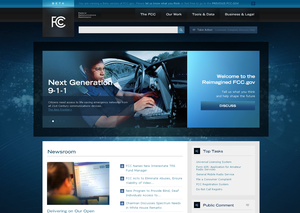When our team set out to tackle the FCC.gov redesign -- the first in 10 years, and a monster project from any angle -- we asked ourselves a fundamental question:
How do we transform the way citizens interact with their government online?
The new FCC.gov launched last week in beta, as I've detailed in an FCC.gov blog post. This milestone offers a few moments to reflect before we dive into the next phase of site development.
The Web has fostered so many different kinds of businesses and ventures, and among them, it may seem like the landscape of government web sites is unique. But in reality,the Web's evolution has created new, higher consumer expectations for all types of Web experiences - for dot govs as well as dot coms.
When you visit a social media site, a shopping site or a search site, you expect it will be intuitive, capture collective knowledge, focus on improvement, connect, entertain and inform you. We've entered an "isn't there an app for that?" culture of expectation. Yet, government has generally not kept pace and these expectations create an opportunity for government to do more.
The first opportunity is culture shift.
Culture shift is big, and it's challenging. Our first step was to create an internal social network inside the building to discuss agency reform and to give employees a safe place to post ideas and suggestions, getting them used to a culture of posting online. We offered guidance and feedback while FCC employees did their first blog posts, videos and tweets, and set expectations from the Chairman down that this was important.
I can't put a definite number on it, but I would guess that the FCC has had more first-time bloggers, tweeters and online feedback providers than just about any agency in DC. The difference inside the building is palpable and real. And while some folks on the outside might not think that these things matter, I assure you the new FCC.gov is powered by an engine that spans the entire agency. There are content creators, technology professionals, and budding new media advisers in every corner of the FCC, and we're leveraging their expertise through these social media platforms.
The second opportunity is cost-savings.
Web 2.0 brought automation and content distribution to a different level. Creating once and publishing in many places has created new efficiencies in time and, importantly, cost. These technologies can free up government resources to do innovative and interesting things with new technology.
On an infrastructure level, our move to cloud-hosted architecture is an investment the agency's future. Instead of needing to budget for new web servers every few years, the move to the cloud shifts part of our IT strategy from capital expenditure (acquiring servers and new software) to operational expenditures (a regularly-recurring budget line item). OpEx is a much easier path in government -- it requires the same diligence around budgeting, but due to procurement cycles, federal budget cycles (including the Continuing Resolution we are in now), and more, OpEx is the way to go in government. It's a meaningful way that new technology helps government save money and work better.
The last opportunity is listening.
The secret sauce for Government 2.0 is to shift from a government that communicates only to a government that participates fully.
From the start, our team's goal was to fundamentally change how citizens interact with their government. We launched a number of microsites, online participation platforms, and user surveys to help us get a grasp of what was working and what needed improvement. New web tools have helped us make sense of social media conversations in actionable ways. We have a better sense now of what our visitors really need from FCC.gov, and what's not as useful.
By listening, we've changed how the FCC works, and made our own operations more effective.
Our new site is a promise. We promise to listen, to break barriers in change-proof bureaucracies, and to implement whatever it takes to continually improve the reimagined FCC.gov. Government has this same opportunity.
